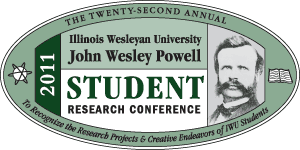Submission Type
Event
Expected Graduation Date
2011
Location
Center for Natural Sciences, Illinois Wesleyan University
Start Date
4-9-2011 9:00 AM
End Date
4-9-2011 10:00 AM
Disciplines
Psychology
Abstract
In politics the political party affiliation of the voter often serves as a predictor for the voting behavior of that individual. However, a voter may occasionally vote against his or her political party, an action known as defection. The present study serves two purposes. The first is to compare defectors and non-defectors across a variety of relevant characteristics, including emotion experienced for one's in-party candidate, attention to media, political understanding, and issue agreement between oneself and one's in-party candidate. The second is to examine the correlations between the individual elements of these theories with one another. Results of this study indicate emotion and issue agreement to be significantly different between defectors and non-defectors, while political understanding and media attention are not. Further correlations were found between emotion and the other topics mentioned, suggesting a relationship between emotions and voting behavior.
Included in
Examining Political Defection: An Analysis of Affective Intelligence, Media Attention, Political Knowledge and Issue Agreement
Center for Natural Sciences, Illinois Wesleyan University
In politics the political party affiliation of the voter often serves as a predictor for the voting behavior of that individual. However, a voter may occasionally vote against his or her political party, an action known as defection. The present study serves two purposes. The first is to compare defectors and non-defectors across a variety of relevant characteristics, including emotion experienced for one's in-party candidate, attention to media, political understanding, and issue agreement between oneself and one's in-party candidate. The second is to examine the correlations between the individual elements of these theories with one another. Results of this study indicate emotion and issue agreement to be significantly different between defectors and non-defectors, while political understanding and media attention are not. Further correlations were found between emotion and the other topics mentioned, suggesting a relationship between emotions and voting behavior.


